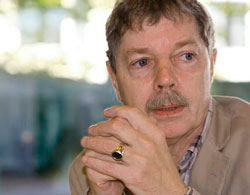Nature and Culture in the Mirror of Knowledge
Lecture by Professor Hans-Jörg Rheinberger who is a scientific member of the Max Planck Society and Director at the Max Planck Institute for the History of Science, Berlin.
Do the humanities and the natural sciences understand each other? How can the "two cultures" thesis be destabilized? And how can we promote a new culture of mutual "call-out-and-in”?
According to the "two cultures" thesis, the natural sciences and the humanities have, in the course of the 20th century, grown apart into fields of knowledge that do not understand each other anymore.
In this lecture, Hans-Jörg Rheinberger destabilizes the contours of this black-and-white thinking and presents the history of disciplines as dramatically ever-changing formations.
Contrasting respective positions of Cassirer, Mannheim, Bachelard and Bourdieu, he discusses concepts of nature and culture on the one hand, and formations of knowledge beyond disciplines on the other.
The gaze beyond – or better, below – the disciplines can be understood as a reaction to the fact that the disciplinary dichotomy between nature and spirit has started to be fundamentally transformed throughout the 20th century. This plea from the point of view of a science historian, instead of looking backwards, aims at promoting a new culture of mutual "call-out-and-in" to deal with an epistemic universe henceforth no longer comprehensible in a dual but in an irreducibly plural mode.
Discussant: Associate Professor David Budtz Pedersen, University of Copenhagen.
Programme
14.00 Welcome David Budtz Pedersen, Humanomic Research Centre (University of Copenhagen)
14.05 Introduction Jens Hauser, Department for Arts and Cultural Studies & Medical Museion (University of Copenhagen)
14.15 Nature and Culture in the Mirror of Knowledge Hans-Jörg Rheinberger, Max Planck Institute for the History of Science, Berlin
15.30 Response David Budtz Pedersen, Humanomic Research Centre (University of Copenhagen)
Organizers
Humanomics Open Research Seminars, Goethe Institute and Jens Hauser
About

Professor Hans-Jörg Rheinberger
Professor Hans-Jörg Rheinberger is a scientific member of the Max Planck Society and Director at the Max Planck Institute for the History of Science, Berlin. He is also a member of the Berlin-Brandenburg Academy of Sciences and Humanities, and of the German National Academy of Sciences Leopoldina.
His research is centrally concerned with the history and the epistemology of experimentation.
He has published books such as Toward a History of Epistemic Things. Synthesizing Proteins in the Test Tube (1997), An Epistemology of the Concrete (2010) and On Historicizing Epistemology: An Essay (2010), and co-authored (with Staffan Müller-Wille) Heredity Produced: At the Crossroads of Biology, Politics, and Culture, 1500-1870 (2007) and A Cultural History of Heredity (2012). Currently, he is working on a book about the philosopher of science Gaston Bachelard and the copper engraver Albert Flocon.
Humanomics Open Research Seminars
New trends in the humanities
Humanomics Research Centre aims at gathering colleagues, PhD students, and advanced students for discussions of new trends and theories in the humanities - ranging from current research projects to theoretical debates about the past, present and future of humanities scholarship.
Please read more on www.mapping-humanities.dk or www.facebook.com/mappinghumanities.
